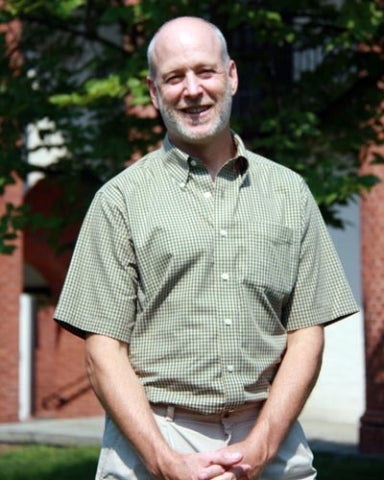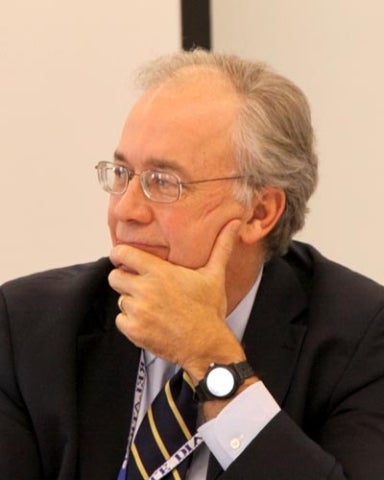Note: Yale School of the Environment (YSE) was formerly known as the Yale School of Forestry & Environmental Studies (F&ES). News articles and events posted prior to July 1, 2020 refer to the School's name at that time.

Just a short walk separates F&ES from the Yale Divinity School (YDS) campus at the top of Prospect Street. Yet it took Stephen Blackmer ’83 more than 20 years after graduating to make the journey up the hill from F&ES. The long circle that brought him back to Yale shows the ways in which environmentalists are seeking a deeper moral and spiritual grounding for their work and how believers are applying their faith to environmental advocacy.
What is wrong with us that we do such violence to the planet, to each other, to ourselves?
Blackmer said he “never dreamed” of taking a course at YDS while studying at F&ES. He wasn’t religious and didn’t see any connection between religious faith and his career. His master’s thesis examined how the 19th-century development of the American canal system affected forests. He briefly considered an academic career but left Yale to work in forest management and environmental advocacy.
Over the next two decades, he proved to be an exceptionally effective environmental coalition builder. Based in New Hampshire, he founded the Northern Forest Alliance (NFA) in 1988 and the Northern Forest Center (NFC) nine years later. The organizations became leading centers in conserving forest land and implementing sustainable forestry practices for the 30 million acres of forest along the United States-Canada border that stretches 400 miles from New York State to Maine. With Blackmer at its head, the NFA doubled the amount of protected natural land in the region, to 3 million acres; at the same time, the NFC “helped move the region from a clear-cut to a sustainable forestry model.”
Over the next two decades, he proved to be an exceptionally effective environmental coalition builder. Based in New Hampshire, he founded the Northern Forest Alliance (NFA) in 1988 and the Northern Forest Center (NFC) nine years later. The organizations became leading centers in conserving forest land and implementing sustainable forestry practices for the 30 million acres of forest along the United States-Canada border that stretches 400 miles from New York State to Maine. With Blackmer at its head, the NFA doubled the amount of protected natural land in the region, to 3 million acres; at the same time, the NFC “helped move the region from a clear-cut to a sustainable forestry model.”
 Stephen Blackmer ’83
Stephen Blackmer ’83
His work brought him a wide following in the regional environmental community and won him national recognition, including the 2003 International Paper Conservation Partnership Award, but then “something happened.”
Blackmer said he started experiencing burnout and a growing recognition that environmental destruction could not be averted only by scientists and the political process. “I had this formless sense that there was a deeper problem to explain the situation, and there was a deeper place I wanted to get to.”
In 2005, in his search for insights, he went on a wilderness vision quest in the Inyo Mountains of southern California, a high-desert region. He spent four days and nights alone with no food and limited water. He returned to New Hampshire wrestling with why individuals and societies damage their environments in the first place. “What is wrong with us that we do such violence to the planet, to each other, to ourselves? How is environmental destruction related to other forms of human harm or evil?”
To find answers, he began attending Christian religious services. He said his prayers led him to the “excruciating” realization that his life as a conservationist was “dead, over” and that resulted in a long period of depression. “My whole identity was wrapped up in that, yet I knew a change had to happen.”
In 2007 he resigned from the NFC (he had already left the NFA) and spent a year as a Bullard Fellow at the Harvard Forest. In 2009 he came to New Haven to study at YDS. He is now completing studies for a master of arts in religion, with a thesis on his own spiritual journey that led him “to become a Christian in order to take my environmental work to the next level.” He intends to become an ordained priest—an “eco-priest,” he calls it—in the Episcopal Church after graduating next spring.
Blackmer said he started experiencing burnout and a growing recognition that environmental destruction could not be averted only by scientists and the political process. “I had this formless sense that there was a deeper problem to explain the situation, and there was a deeper place I wanted to get to.”
In 2005, in his search for insights, he went on a wilderness vision quest in the Inyo Mountains of southern California, a high-desert region. He spent four days and nights alone with no food and limited water. He returned to New Hampshire wrestling with why individuals and societies damage their environments in the first place. “What is wrong with us that we do such violence to the planet, to each other, to ourselves? How is environmental destruction related to other forms of human harm or evil?”
To find answers, he began attending Christian religious services. He said his prayers led him to the “excruciating” realization that his life as a conservationist was “dead, over” and that resulted in a long period of depression. “My whole identity was wrapped up in that, yet I knew a change had to happen.”
In 2007 he resigned from the NFC (he had already left the NFA) and spent a year as a Bullard Fellow at the Harvard Forest. In 2009 he came to New Haven to study at YDS. He is now completing studies for a master of arts in religion, with a thesis on his own spiritual journey that led him “to become a Christian in order to take my environmental work to the next level.” He intends to become an ordained priest—an “eco-priest,” he calls it—in the Episcopal Church after graduating next spring.
I was like many people my age, enjoying the environment but not aware of how much it was at risk.
Blackmer is among an increasing number of students at Yale who are combining religious and environmental studies. In each of the past five years, around 10 new students have enrolled in the first—and what remains the world’s only—formal joint degree program in divinity and environmental studies. The students ultimately earn master’s degrees from both programs.
Even more formal ties between the two schools are in the offing, with the drive to establish the first permanently endowed position for a senior professor studying the intersection between religion and the environment. Blackmer is part of a team presently raising funds for the H. Boone and Violet M. Porter Chair in Religion and Environmental Stewardship. (The Porter Foundation has pledged $3 million to support the chair, which honors H. Boone Porter ’96, a theologian in the Episcopal tradition and author, and his wife, Violet.) When fully funded, F&ES and YDS will jointly select the chair, who will also guide a joint-degree program in religion and environmental stewardship.
“As an academic field, ecology and religion is maybe a decade old in its formal emergence, yet the field’s literature is already immense,” said Willis Jenkins, a specialist in environmental ethics and Christian theology and the first to hold the Margaret Farley Assistant Professor of Social Ethics at YDS. “But it’s not just scholarly productivity that propels the field ahead; it’s also the ferment in religious communities over how to respond to environmental issues.”
Even more formal ties between the two schools are in the offing, with the drive to establish the first permanently endowed position for a senior professor studying the intersection between religion and the environment. Blackmer is part of a team presently raising funds for the H. Boone and Violet M. Porter Chair in Religion and Environmental Stewardship. (The Porter Foundation has pledged $3 million to support the chair, which honors H. Boone Porter ’96, a theologian in the Episcopal tradition and author, and his wife, Violet.) When fully funded, F&ES and YDS will jointly select the chair, who will also guide a joint-degree program in religion and environmental stewardship.
“As an academic field, ecology and religion is maybe a decade old in its formal emergence, yet the field’s literature is already immense,” said Willis Jenkins, a specialist in environmental ethics and Christian theology and the first to hold the Margaret Farley Assistant Professor of Social Ethics at YDS. “But it’s not just scholarly productivity that propels the field ahead; it’s also the ferment in religious communities over how to respond to environmental issues.”
 Christopher Glenn Sawyer
Christopher Glenn Sawyer
While YDS is interdenominational, with approximately 45 denominations represented among faculty and students, historically students have gone on to positions as clergy and lay officials, as well as educators and scholars, with mainline Protestant traditions. (The affiliated Berkeley Divinity School at Yale, an Episcopal seminary, prepares students for ordination into the ministry.) According to Dean Harry Attridge, “environmentalism is part of being good stewards of the Creation.” Linking and exploring that religious outlook in conjunction with F&ES’ policy and science approach are ways, he explains, for the religious community to “play a positive role in facing global environmental challenges. We prepare religious leaders to think about ethical questions. These are major questions for our time.”
F&ES Dean Peter Crane said, “For a huge segment of the global population, religion is fundamental to the way they view the world. It doesn’t matter how good policy and science are unless you engage the people. We should be thinking deeply about ethics, and that includes the religious dimension.”
Christopher Glenn Sawyer has been among those spearheading Yale’s efforts to add a religious dimension to environmental studies and education. He received a master of divinity degree in 1975, and after graduating from Yale he obtained a law degree at Duke University. He went on to develop a thriving corporate and real estate law practice with the Atlanta firm of Alston & Bird, where he is now a partner. He kept close ties with Yale, and has either chaired or co-chaired the YDS Board of Advisors since 2003.
Mary Evelyn Tucker, co-director with John Grim of the Forum on Religion and Ecology at Yale, said the joint program at Yale is unique and indispensable for the future of environmental studies and the environmental movement. “Both Steve and Chris represent a growing awareness of the need for an ethical and spiritual approach to environmental issues. Their contributions will continue to be critical,” she said. Grim added: “Students will continue to try and integrate their ecological studies with the moral challenges we are facing. It is a great privilege to be engaged in this exploration with them.”
An avid outdoorsman, Sawyer developed an interest in environmental issues in the early 1990s. “I was like many people my age, enjoying the environment but not aware of how much it was at risk,” he said. Through his real estate law practice, he recognized Atlanta’s growing need to manage the sprawling development overtaking its surrounding countryside. “I decided I wanted to get involved in public service that wasn’t just legally oriented,” he said.
Sawyer soon had his hand in some of the most significant conservation efforts in the country. From 1995 to 2003 he was board chair of the Trust for Public Land. Under his leadership, the trust acquired approximately $2 billion in land for parks and nearly doubled the number of its city offices, to 38.He also was founding chair of the Nature Conservancy’s National Real Estate Advisory Board and founded and headed the Chattahoochee River Coordinating Committee, which has raised more than $150 million for the acquisition of 70 miles of Chattahoochee River frontage for parks. He is also a member of the F&ES Leadership Council.
Sawyer likened conservation to the fight for civil rights, calling it a “moral imperative.” Sawyer said most people affiliated with religious organizations support environmentalism and land conservation, and he thinks there’s a huge resource for environmental activism going untapped. He’d like to see clerical and lay leaders acquire education in complex environmental challenges, such as climate change, to help guide and mobilize their organizations and followers. He said Yale is the right place to begin forging a “natural union” between religious communities and environmental science and policy.
He thinks environmental scientists need the church’s “moral authority” to turn their findings into action. “I want to get the religious community more connected to the scientific community to leverage 90 million to 100 million (church-affiliated) people in the United States to support and work for environmental causes.”
Bringing two distinct cultures of faith and science together, however, requires that the two academically distinct, if closely situated, professional schools learn to speak each other’s language. Sawyer convened joint meetings of the F&ES Leadership Council and the YDS Board of Advisors, and those gatherings eventually coalesced around the creation of the joint-degree program.
Sawyer believes that the leaders emerging from this program will “accelerate the movement of centers of faith into environmentalism.” Blackmer shares that belief in the power of religion. “The bottom line is this: It is not only failed or outdated policies, technologies and economies that are the problem. We are. By allowing myself to be transformed, I can bring further transformation into the world. And if that kind of change can spread, there is hope even in the face of the worst violence and destruction.”
F&ES Dean Peter Crane said, “For a huge segment of the global population, religion is fundamental to the way they view the world. It doesn’t matter how good policy and science are unless you engage the people. We should be thinking deeply about ethics, and that includes the religious dimension.”
Christopher Glenn Sawyer has been among those spearheading Yale’s efforts to add a religious dimension to environmental studies and education. He received a master of divinity degree in 1975, and after graduating from Yale he obtained a law degree at Duke University. He went on to develop a thriving corporate and real estate law practice with the Atlanta firm of Alston & Bird, where he is now a partner. He kept close ties with Yale, and has either chaired or co-chaired the YDS Board of Advisors since 2003.
Mary Evelyn Tucker, co-director with John Grim of the Forum on Religion and Ecology at Yale, said the joint program at Yale is unique and indispensable for the future of environmental studies and the environmental movement. “Both Steve and Chris represent a growing awareness of the need for an ethical and spiritual approach to environmental issues. Their contributions will continue to be critical,” she said. Grim added: “Students will continue to try and integrate their ecological studies with the moral challenges we are facing. It is a great privilege to be engaged in this exploration with them.”
An avid outdoorsman, Sawyer developed an interest in environmental issues in the early 1990s. “I was like many people my age, enjoying the environment but not aware of how much it was at risk,” he said. Through his real estate law practice, he recognized Atlanta’s growing need to manage the sprawling development overtaking its surrounding countryside. “I decided I wanted to get involved in public service that wasn’t just legally oriented,” he said.
Sawyer soon had his hand in some of the most significant conservation efforts in the country. From 1995 to 2003 he was board chair of the Trust for Public Land. Under his leadership, the trust acquired approximately $2 billion in land for parks and nearly doubled the number of its city offices, to 38.He also was founding chair of the Nature Conservancy’s National Real Estate Advisory Board and founded and headed the Chattahoochee River Coordinating Committee, which has raised more than $150 million for the acquisition of 70 miles of Chattahoochee River frontage for parks. He is also a member of the F&ES Leadership Council.
Sawyer likened conservation to the fight for civil rights, calling it a “moral imperative.” Sawyer said most people affiliated with religious organizations support environmentalism and land conservation, and he thinks there’s a huge resource for environmental activism going untapped. He’d like to see clerical and lay leaders acquire education in complex environmental challenges, such as climate change, to help guide and mobilize their organizations and followers. He said Yale is the right place to begin forging a “natural union” between religious communities and environmental science and policy.
He thinks environmental scientists need the church’s “moral authority” to turn their findings into action. “I want to get the religious community more connected to the scientific community to leverage 90 million to 100 million (church-affiliated) people in the United States to support and work for environmental causes.”
Bringing two distinct cultures of faith and science together, however, requires that the two academically distinct, if closely situated, professional schools learn to speak each other’s language. Sawyer convened joint meetings of the F&ES Leadership Council and the YDS Board of Advisors, and those gatherings eventually coalesced around the creation of the joint-degree program.
Sawyer believes that the leaders emerging from this program will “accelerate the movement of centers of faith into environmentalism.” Blackmer shares that belief in the power of religion. “The bottom line is this: It is not only failed or outdated policies, technologies and economies that are the problem. We are. By allowing myself to be transformed, I can bring further transformation into the world. And if that kind of change can spread, there is hope even in the face of the worst violence and destruction.”
Published
January 1, 2000